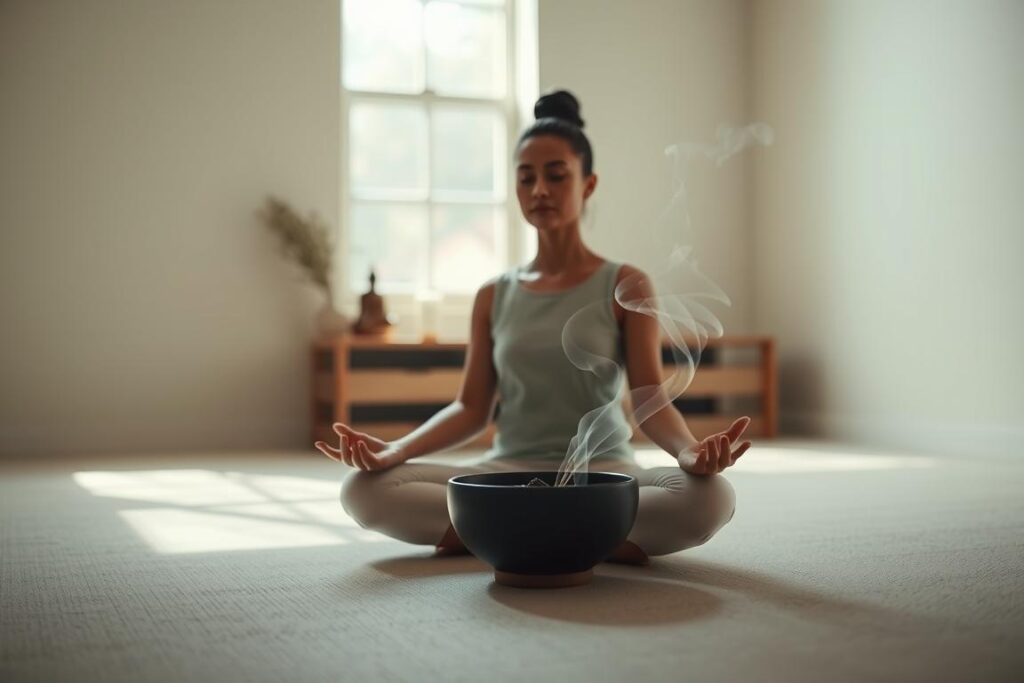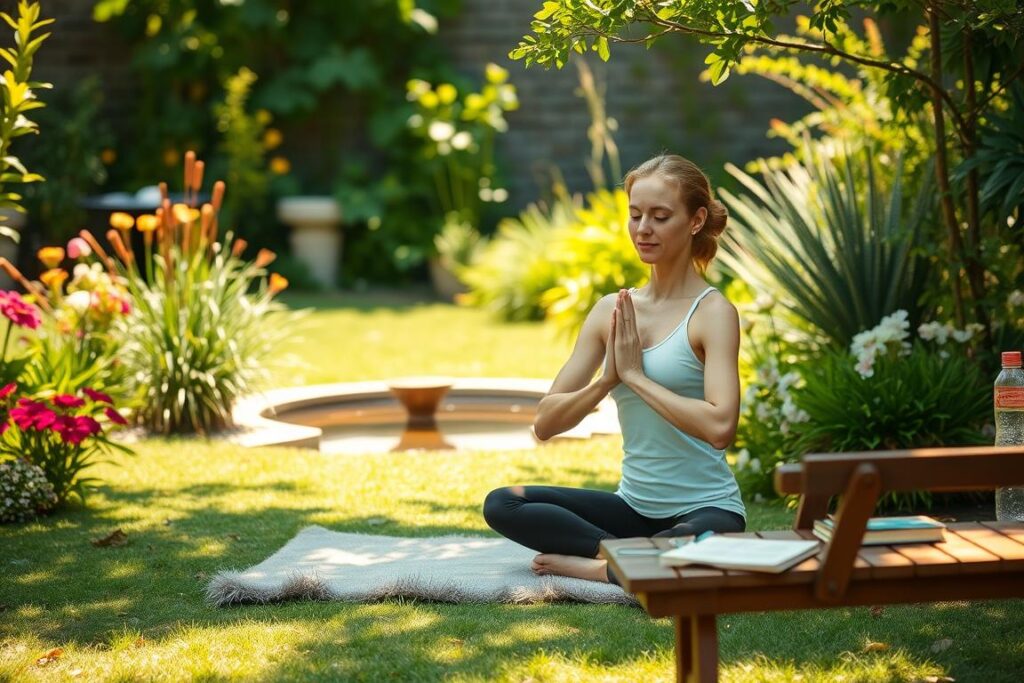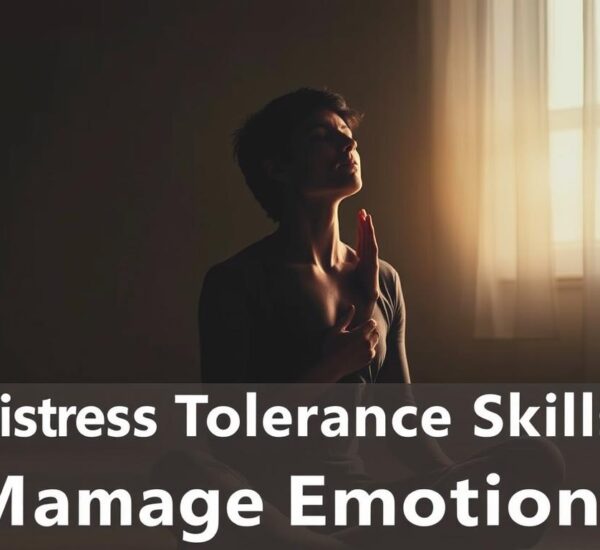Stress can be overwhelming, affecting our mental health and overall well-being. Effective stress management is key for keeping a positive self-image and balance during tough times.
We often face situations that test our ability to manage stress and anxiety. By adopting the right coping mechanisms, we can handle these challenges better. This article will look at various techniques for managing stress, improving our mental health, and boosting our quality of life.
Key Takeaways
- Understanding the importance of stress management for mental health.
- Identifying effective coping mechanisms for anxiety.
- Practical tips for implementing stress management techniques.
- The role of mental health tips in overall well-being.
- Strategies for maintaining a positive self-image under stress.
Understanding Stress and Anxiety
To handle stress and anxiety, we need to know what they are and how they affect us. In today’s world, building emotional resilience and coping skills is key to keeping our minds healthy.
Stress is how our body reacts to new or tough situations. It’s something everyone goes through. So, it’s important to find ways to deal with it and take care of ourselves.
What is Stress?
Stress happens when we face challenges that make us adapt or change. It can come from work, money worries, or personal issues. Knowing what causes stress helps us find ways to lessen its effects.
What is Anxiety?
Anxiety is feeling worried, nervous, or scared all the time. It can make everyday tasks hard and take away the joy from things we love. Spotting the signs of anxiety is the first step to getting help and finding ways to cope.
Common Symptoms
Stress and anxiety can show up in many ways, affecting our minds and bodies. We might feel overwhelmed, irritable, or have trouble focusing. We might also get headaches or feel really tired.
| Symptom | Stress | Anxiety |
|---|---|---|
| Feelings of Overwhelm | Common | Common |
| Irritability | Common | Occasional |
| Difficulty Concentrating | Occasional | Common |
| Physical Complaints | Common | Common |
Knowing what stress and anxiety are, how they show up, and their effects helps us find better ways to deal with them. This way, we can improve our overall well-being.
Importance of Coping Strategies
## Importance of Coping Strategies
Learning to cope with stress and anxiety is key to our daily well-being. When we face challenges, having the right tools to handle stress matters a lot. It greatly affects our overall health.
### Why Coping Matters
Coping strategies help us manage stress and anxiety well. By using positive ways to cope, we lessen stress’s bad effects on our mental health. The third source says, “Building emotional strength, being in control, having a good social network, and a positive outlook are important for stress management.” This shows how vital effective coping strategies are.
### Benefits of Effective Coping
Good coping strategies bring many benefits. They improve our mental health, make us more resilient, and enhance our overall well-being. By managing stress well, we avoid it turning into serious mental health problems. For example,stress management techniqueshelp prevent chronic diseases.
### Long-term Impact
The long-term effects of good coping strategies are significant. By using positive coping methods and building support systems, we improve our mental and physical health over time. This leads to a better life and helps us deal with future stress better.
Effective coping strategies fall into several main areas, as shown in the table below:
| Coping Mechanism | Description | Benefits |
|---|---|---|
| Mindfulness Techniques | Practices that help individuals stay present and focused | Reduces stress and anxiety |
| Support Systems | Networks of family, friends, and community | Provides emotional support and connection |
| Positive Coping Mechanisms | Activities that promote well-being, such as exercise and hobbies | Enhances mental and physical health |
By understanding the importance of coping strategies and using them in our lives, we can greatly improve our stress and anxiety management.
Mindfulness and Meditation Techniques
We can greatly improve our mental health by adding mindfulness and meditation to our daily routine. These practices are great for managing stress and anxiety. Just a few minutes each day can bring calm and clarity to our lives. For more tips on mental health and stress, check out Stress Less, Live More: Mental Health.
Introduction to Mindfulness
Mindfulness means being fully present and engaged in the moment, without judgment. It’s about noticing our thoughts, feelings, and body sensations with curiosity. By doing mindfulness, we can lower stress and anxiety by stopping endless worrying. Mindfulness can be done anywhere, at any time, making it a flexible way to cope.
Simple Meditation Practices
Meditation helps us focus on the present and reduces stress. You can try focusing on your breath, body scan meditation, or guided meditation. Start in a quiet, comfy spot where you can sit or lie down without distractions. Begin with short sessions, like 5-10 minutes, and grow them as you get more comfortable. Regular meditation can greatly reduce stress and anxiety.
Breathing Exercises
Breathing exercises are a simple yet effective way to practice mindfulness and lower stress. Try the “4-7-8” breathing method: breathe in through your nose for 4 counts, hold for 7 counts, and breathe out through your mouth for 8 counts. This can slow your heart rate and help you relax. 
Physical Activity for Stress Relief
Physical activity is key in managing stress and boosting emotional resilience. Adding exercise to our daily life can lower stress and better our health.
Benefits of Exercise
Exercise is a strong stress reliever, improving both physical and mental health. It cuts down anxiety and depression, lifts our mood, and sharpens coping skills. It also leads to better sleep, more energy, and higher self-esteem.
Exercise also distracts us from daily stress, helping us stay in the moment and practice self-care. Whether it’s a quick walk, yoga, or intense workouts, it makes us see life more positively.
Types of Physical Activities
There are many ways to ease stress and anxiety through physical activities. Some favorites include:
- Aerobic exercises, like running, cycling, or swimming
- Yoga and Pilates, which mix movement with mindfulness
- Strength training, boosting confidence and reducing stress
- Low-impact activities, like walking or tai chi, for all fitness levels
Creating an Exercise Routine
To enjoy the benefits of exercise, we need a regular routine. Begin with achievable goals and pick activities you like. Plan your workouts to fit your life, and slowly increase the challenge as you get more comfortable.
Every bit of physical activity matters. A short walk at lunch or a few jumping jacks during TV breaks can help. By prioritizing exercise, we build coping skills and enhance our well-being.
Social Support Systems
Having a strong network of friends, family, and colleagues can really help us deal with work stress. It helps us see things from a new angle. This shows how important social support is for our well-being, helping us manage stress and anxiety.
Social support systems are key for our mental health. They make us feel connected, reduce loneliness, and offer emotional support when we need it. By taking care of these relationships, we can handle life’s tough times better.
Importance of Relationships
Relationships are the core of our social support systems. They give us emotional support, practical help, and a feeling of belonging. It’s vital to nurture these bonds for our mental health and strength.
To strengthen relationships, we must put in time and effort. This means staying in touch, showing gratitude, and being there for others. By doing this, we create a network that supports us when things get tough.
How to Build Support Networks
Creating a support network takes purpose and hard work. Here are some ways to build yours:
- Know what you need and find people who can help.
- Join groups or clubs that match your interests.
- Volunteer to meet people who share your values.
- Keep in touch with loved ones regularly.
For more tips on building lasting relationships, check out secrets to nurturing long-lasting romantic relationships.
Engaging with the Community
Getting involved in our community is a great way to grow our support networks. This can mean attending local events, joining groups, or volunteering for causes we believe in.
| Community Engagement Activity | Benefits |
|---|---|
| Volunteering | Meets like-minded people, sense of purpose |
| Joining community groups | Shared interests, social connections |
| Participating in local events | Community involvement, networking opportunities |
Healthy Lifestyle Choices
Making healthy lifestyle choices is key to managing stress and anxiety. Simple habits can greatly improve our mental health.
Healthy choices include a balanced diet, regular sleep, and less substance use. These habits help us deal with stress and anxiety every day.
Nutrition and Mental Health
A balanced diet full of nutrients is vital for good mental health. Foods rich in omega-3 fatty acids, like salmon and walnuts, can lessen anxiety symptoms.
We should also eat a variety of fruits, vegetables, and whole grains. These foods give us the vitamins and minerals our minds need.
- Eat a balanced diet with lots of fruits and vegetables.
- Add foods rich in omega-3 fatty acids to your meals.
- Stay away from too much processed food and sugar.

Importance of Sleep
Getting enough quality sleep is key for managing stress and anxiety. Adequate sleep helps control our emotions and lowers stress.
To sleep better, set up a bedtime routine and make your bedroom sleep-friendly. For more sleep tips, check out this resource.
- Stick to a regular sleep schedule.
- Have a calming bedtime routine.
- Stay away from caffeine and screens before bed.
Reducing Substance Use
Lowering or stopping substance use greatly affects our mental health. Substance abuse can make stress and anxiety worse, making it harder to cope.
We can cut down on substance use by getting support from loved ones or professionals. Making this choice can greatly improve our well-being.
- Get help from friends and family.
- Look into professional help if needed.
- Try other ways to cope, like exercise or meditation.
Cognitive Behavioral Strategies
Using cognitive behavioral strategies can boost our emotional strength. Cognitive Behavioral Therapy (CBT) helps manage stress and anxiety. It focuses on how our thoughts, feelings, and actions are linked.
Understanding CBT Techniques
CBT techniques help us spot and change negative thoughts and actions that cause stress and anxiety. Key techniques include cognitive restructuring, exposure therapy, and mindfulness. These methods help us find better ways to cope and improve our mental health.
- Cognitive restructuring helps us change distorted or unhelpful thinking patterns.
- Exposure therapy helps us face and manage situations that make us anxious.
- Mindfulness practices help us stay in the moment, reducing worries about the past or future.
Challenging Negative Thoughts
Challenging negative thoughts is a key part of CBT. It means becoming more aware of our thoughts, checking if they’re true, and replacing them with better ones. It’s about seeing things in a more positive and realistic way.
- Identify the negative thought.
- Check the evidence for and against the thought.
- Replace the negative thought with a more balanced one.
Setting Realistic Goals
Setting realistic goals is also important in CBT. Achievable goals help us feel confident, motivated, and accomplished. It’s about breaking down big goals into smaller, easier tasks, making progress feel more real and less scary.
By using these cognitive behavioral strategies every day, we can improve our coping skills and emotional strength. It’s about making a promise to ourselves to practice these techniques often. This leads to a more balanced and fulfilling life.
Creative Outlets for Expression
Dealing with stress and anxiety can be tough. It’s key to find new ways to express ourselves and feel better. Creative activities offer a great way to do this. They help us relax and find calm.
Art is a powerful tool for creative expression. Art therapy helps reduce stress and anxiety. It lets us show our feelings without words, which is very helpful.
Art as a Coping Mechanism
Artistic activities like painting or drawing can be very therapeutic. They help us focus on the creative process, taking our minds off stress. Plus, making art can make us feel proud and boost our self-esteem.
- Try different art forms to see what you like.
- Use art to express feelings that are hard to say out loud.
- Make a special place for art in your home.
Writing and Journaling
Writing and journaling are great for managing stress and anxiety. Writing down our thoughts helps us process and release them. It also helps us see patterns and find better ways to cope.
- Start a daily journal to reflect on your day.
- Write freely about your feelings and thoughts.
- Use prompts or exercises to help your writing.
Music and Movement Therapy
Music and movement therapy are also great creative outlets. Activities like dance or yoga can reduce stress by releasing happy hormones. Listening to or making music can also calm us down and relax our muscles.
- Find music that calms you.
- Do physical activities that make you happy, like dancing or yoga.
- Take music or movement classes to learn new things.
Adding these creative outlets to our lives can help us manage stress and anxiety better. By trying different ways to express ourselves, we can find what works best for us. This helps us feel better and be more resilient.
Seeking Professional Help
When stress and anxiety get too much, getting professional help is key. We’ve looked at many ways to handle stress, like mindfulness and exercise. But sometimes, we need more than that.
Recognizing the Need for Therapy
If we or someone we know is really struggling, help is out there. The National Suicide Prevention Lifeline (988) offers support by call, text, or chat. Knowing when to get therapy is important. It shows strength, not weakness, to ask for help.
Types of Professionals and Resources
Mental health experts like psychologists and therapists can help a lot. You can find them online, through your doctor, or at community centers. Getting advice from them can help us find better ways to cope.
By recognizing the need for help, we take charge of our mental health. Let’s make our mental well-being a priority. We can use the resources available to manage stress and anxiety better.



